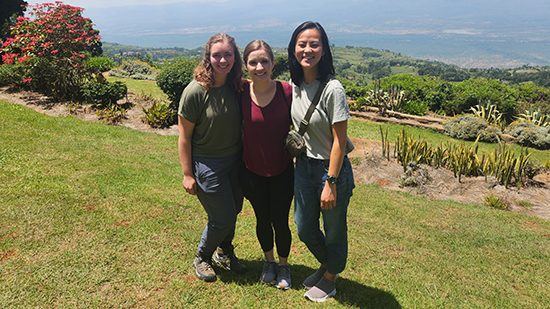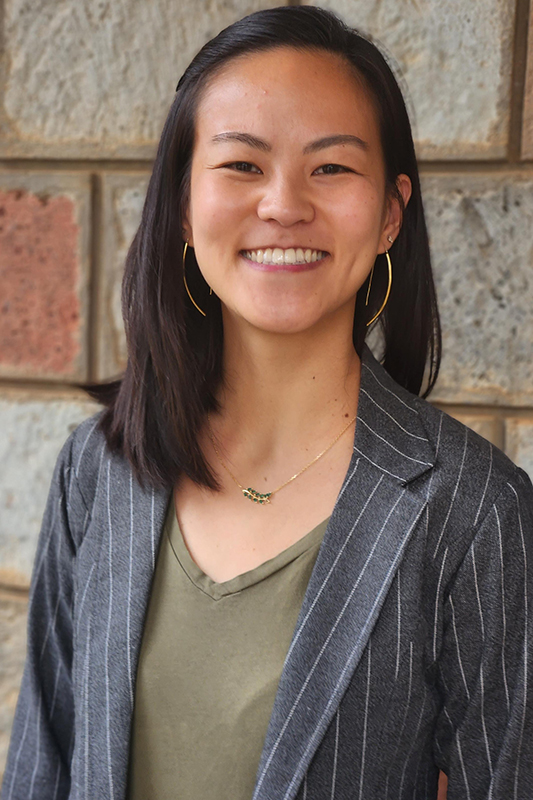Surgery is often viewed as a hospital-based specialty, but the foundation of a successful surgery often depends on a variety of factors outside of the operating room such as pre-operative risk assessment, access to follow-up care, the ability to obtain medication and supplies, and adherence to post-surgical instructions and restrictions.
In many low and middle-income countries, barriers to pre- and post-surgical care can have a significant impact on the health and well-being of patients.
“In my opinion, we need to zoom out in global surgery and recognize that surgical care is not a single instant in time in the operating room. It's a whole cascade of events that all surgeons are responsible for and have a responsibility to consider,” said Helen Li, MD, a graduate of Indiana University School of Medicine and now a surgical resident at Washington University in St. Louis.
Dr. Li was selected for the 2023-24 Fogarty International Center’s Global Health Fellows and Scholars Program, now called Launching Future Leaders in Global Health (LAUNCH) Research Training Program. Her research project is entitled “Management of Ventral Hernias through the Surgical ‘Cascade’ at a Kenyan National Referral Hospital: A longitudinal, mixed-methods study.”
During her Fogarty research year with the AMPATH partnership in Kenya, she will use both qualitative and quantitative methods to describe the patient population presenting with ventral hernias at Moi Teaching and Referral Hospital (MTRH), identify risk factors associated with high-complexity ventral hernias and explore patients’ experience in ventral hernia care.
Dr. Li was selected for the Fogarty opportunity through the Northern/Pacific Global Health (NPGH) Training Consortium which includes Indiana University and Moi University in Kenya as partners. The Global Health Fellowship Program is a 12-month clinical research training program for post-doctorate trainees and doctoral students in the health professions in the US and post-doctorate trainees from low- and middle-income countries.
In her Fogarty application, Dr. Li stated that hernia repairs represent one of the most prevalent general surgery procedures performed globally. Ventral hernias are uniquely complex because they may occur on their own or following prior abdominal surgery. In low- and middle-income countries there is significant socioeconomic impact resulting from hernias in previously healthy, productive individuals.
According to Dr. Li, the research project will study data from clinical appointments, operations and the hospitalization period for patients with ventral hernias. A group of patients will be followed during their post-surgical period and interviewed about their experience to better understand their experiences through the whole surgical cascade.
“One of our privileges as surgeons is that we meet every patient, and we get to place our hands on every patient. We make incisions on people. It's the most vulnerable that a patient can be, and they trust us. Because of that, I think we have a responsibility to walk with the patient through each step of their care,” said Dr. Li. “Surgeons must build a deeper understanding of the healthcare system and what risks patients may face.”
This year’s Fogarty cohort includes 6 surgeons from the U.S. and 4 from low- and middle-income countries. “All of our projects have to do with capacity building,” said Dr. Li. “In a lower resource setting, how do we achieve that same level of care for our patients? That often requires a little bit of innovation, a lot of collaboration, a lot of imagination and just stubbornness to say, ‘No, we won't accept any less’,” she said. “Working alongside my Kenyan mentors and colleagues, I hope that we will be able to support strengthening local surgical systems in a sustainable and equitable fashion. It is great to see that that sentiment appears to be shared across all the surgery Fogarty fellows in my cohort this year.”
The year-long Fogarty Fellowship experience includes access to research training during a summer orientation hosted by the Fogarty International Center that also includes concentrated training in either qualitative or quantitative methods. Dr. Li participated in the qualitative training and is eager to expand her knowledge in mixed-methods research. “This is my first venture into qualitative work, which is exciting,” she said.
Additionally, each Fogarty Fellow assembles a mentorship team from both the U.S. and the country in which they are working. Dr. Li’s mentor team includes faculty from IU, MTRH, and Washington University in St. Louis and is led by Seno Ivan Saruni, MBBS, FCS (ECSA), consultant general surgeon at MTRH; Jeffrey A. Blatnik, MD, FACS, director of Washington University Hernia Center; and JoAnna Hunter-Squires, MD, assistant professor of clinical surgery at IU School of Medicine and past AMPATH surgery team leader.
“This study will impact care from different angles,” said Dr. Seno. “First will be a true identification of the burden of disease from ventral hernias and their main presentation among the population in Kenya especially in the western and Rift Valley parts of the country. It will then identify availability of resources for addressing the burden of disease and subsequently follow up on immediate post-operative complications. This will guide the teams in future decision making and both proper patient selection and choice of repair.”
“I think that residents, and surgery residents specifically, spend the majority of their time in a small silo of the institution that they do their training. Many are limited to the patient populations that seek care there and can fail to get a broad understanding of the medical field both within our country and globally,” said Dr. Blatnik. “With opportunities such as the Fogarty Fellowship, trainees can combine their specific interest in medicine with obtaining a better appreciation for the challenge of delivering healthcare in what are very unique environments.”
Dr. Li has had several opportunities to work within the AMPATH partnership including as a Slemenda Scholar during the summer after her first year at IU School of Medicine and as a Doris Duke Fellow for a year later in her medical school career. “I think the best thing about AMPATH has always been the informal mentorship or collaboration opportunities that just happen across the dinner table, or just walking home from the hospital,” said Dr. Li. “It's all about relationships and I'm very grateful to have access to this large network of experts and working in that community.”
When considering her future research career direction, she values the system-based improvements that research enables and the integration of both care and education in surgical research. “I was told by one of my mentors that a Fogarty isn't an investment in the project, it's an investment in the applicant and their future as a researcher. Part of the Fogarty experience is building a great mentorship network and identifying people that can help you grow both in your career and as a person. Having the protected time and support to do that is a truly unique opportunity that is rare to find as a trainee,” she said.
Applications for the Fogarty Fellows and Scholars program for 2024-25 are now available and close on November 1. The program is sponsored by the National Institute of Health’s Fogarty International Center in partnership with several NIH Institutes and Centers. Interested post-doctorate trainees and doctoral students in the health professions at IU can receive more information and assistance from Dibya Datta, MS, PhD, principal investigator for the program at IU.
For trainees considering applying for a Fogarty Fellowship, Dr. Li has one piece of advice: “Just take the leap.”

Dr. Helen Li (far right) and other trainees in Kenya.



